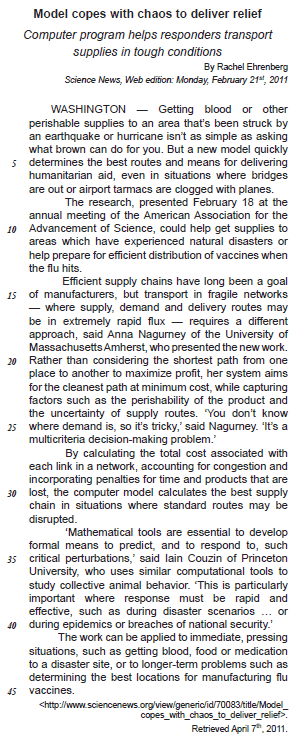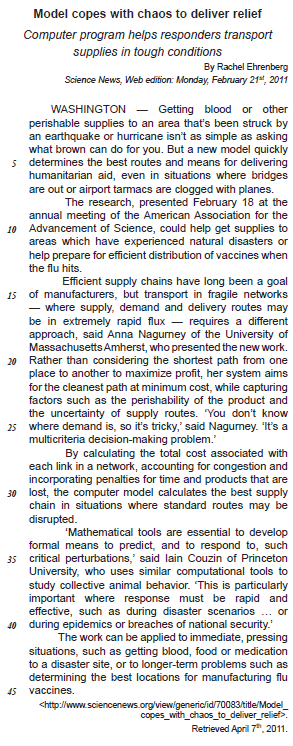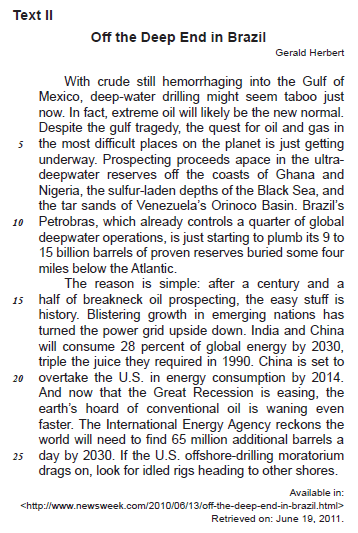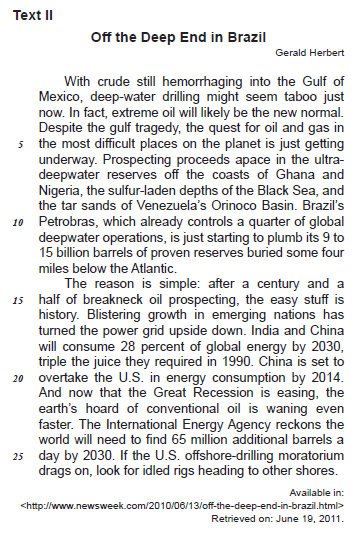Questões de Língua Inglesa da Fundação CESGRANRIO (CESGRANRIO)
Lista completa de Questões de Língua Inglesa da Fundação CESGRANRIO (CESGRANRIO) para resolução totalmente grátis. Selecione os assuntos no filtro de questões e comece a resolver exercícios.

The communicative intention of the article is to
- A.
criticize the inefficient transportation of supplies during stressful events.
- B.
announce a study to identify an effective strategy to distribute goods and services in emergencies.
- C.
alert society about the arguments against the delivery of humanitarian aid during natural disasters.
- D.
report on a computational model to speed up the shipment of perishable products through clogged roads in summer.
- E.
argue that the building of alternative highways is paramount to a more efficient distribution of supplies in everyday situations.

such critical perturbations, (lines 34-35) refers to all the items below, EXCEPT
- A.
congestion
- B.
delivery delays
- C.
computer supplies
- D.
disrupted roads
- E.
loss of products


The communicative intention of Text I is to
- A.
classify all the economic risks Brazil will certainly run if it insists on extracting oil at great depth.
- B.
suggest that Brazil could soon be ranked as one of the four main oil producers in the whole world.
- C.
argue that Brazil should try to avoid potential dangers associated to its recent deepwater oil discoveries.
- D.
report on the rising tensions between China and Brazil over the manufacturing sector of the world economy.
- E.
announce the expected growth of the oil industry in Brazil, Nigeria and Venezuela in the coming decades.

=According to paragraphs 9 and 10 (lines 55-65), investing in R&D
- A.
may open new markets for the Brazilian technological sector of oil extraction at great depth.
- B.
may justify Petrobras plans to reduce the development of its research center.
- C.
is surely leading Brazilian engineers to work for African countries rich in natural resources.
- D.
will pay immediate dividends in the challenging sector of geology and oil exploitation.
- E.
can explain why Petrobras is spending $800m - $900m to extract oil at great depth.

Concerning the referent to the pronoun it, in the fragments below,
- A.
in It looks and smells like ordinary crude oil. (line 5), it refers to beaker (line 4).
- B.
in The danger for Brazil, if it fails to manage this windfall wisely, is of falling victim to Dutch disease. (lines 28-29), it refers to danger (line 28).
- C.
in ... Brazilian engineers see it as a new frontier. (lines 59-60), it refers to coast (line 58).
- D.
in making it harder for Brazilian exporters of manufactured goods. (lines 75-76), it refers to stream (line 75).
- E.
in its just going to be starved for those resources, says Harvards Prof Rogoff. (lines 81-83), it refers to China (line 81).

In Without a firm local content policy, says Petrobras CEO, Dutch disease and the oil curse will take hold. (lines 50-52), take hold means to
- A.
become more easily controlled.
- B.
become stronger and difficult to stop.
- C.
be completely defeated and ineffective.
- D.
be absolutely harmless and disappointing.
- E.
be transformed into very powerful assets.

The boldfaced item is synonymous with the expression in parentheses in
- A.
Nevertheless, for Brazil, this represents something much more spectacular. (lines 6-7) (Thus)
- B.
neither the company nor the countrys oil industry has so far been big enough to become a government cash cow. (lines 39-41) (meanwhile)
- C.
However, if we have a firm and successful local content policy, no (lines 52-53) (Moreover)
- D.
because other sectors in the economy are going to grow as fast as Petrobras. (lines 53-54) (due to the fact that)
- E.
Ultimately, Brazils ability to avoid Dutch disease will depend not just on how the money from the oil is spent. (lines 66-68) (Furthermore)

Comparing Texts I and II,
- A.
only Text I mentions an environmental disaster derived from deepwater oil prospection.
- B.
only Text II reports on Chinas intensive economic growth and absolute need of commodities.
- C.
neither Text I nor Text II express concern for the implications of the explorations of offshore oil deposits to local economies.
- D.
both Text I and Text II present Brazils potential of holding an outstanding position concerning worldwide deepwater reserves and exploration.
- E.
Text I mentions Brazil, Nigeria and Venezuela to criticize their addiction to oil revenues, while Text II mentions these countries to illustrate successful examples of conventional oil prospection.

According to Text II, in spite of the oil spill disaster in the Gulf of Mexico,
- A.
the US will soon surpass China in energy consumption.
- B.
the conventional drilling of oil and gas is seen as a taboo now.
- C.
in twenty years, the whole world will need 65 million barrels a day.
- D.
energy consumption of India and China will double in ten years time.
- E.
deepwater oil and gas prospecting has not been halted in other regions of the globe.

In Text II, Herbert illustrates the possibility of ...idled rigs heading to other shores. (line 26) EXCEPT when he mentions
- A.
prospection in ultra-deepwater reserves off the coasts of Ghana and Nigeria.
- B.
deepwater operations in the sulfur-laden depths of the Black Sea.
- C.
the quest for oil in the tar sands of Venezuelas Orinoco Basin.
- D.
the suspension of the US offshore-drilling moratorium.
- E.
Brazils drillings four miles below the Atlantic.


